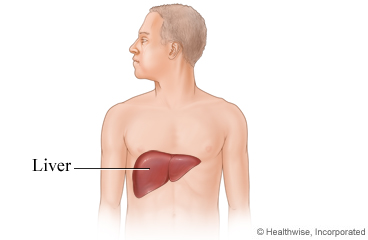
Overview
Hepatitis A is a virus that can infect the liver. Most people who get it get better within 3 months and don't have liver problems later.
This virus is found in stool (feces). You can get it if you eat food or drink water that was in contact with infected stool. You can also get it from close contact with an infected person.
Common symptoms include feeling tired or having yellow eyes and skin (jaundice). They also include nausea, diarrhea, vomiting, and a severe loss of water (dehydration).
Some people don't notice any symptoms for up to 30 days. But even without symptoms, you still can give the infection to other people.
Some people get a shot if they know they were exposed to the virus in the past 2 weeks. Ask your doctor if you need a hepatitis A vaccine or an immunoglobulin shot. These may prevent getting infected with hepatitis A.
After you get hepatitis A one time, you can't get it again. But you can still get other types of hepatitis.
Follow-up care is a key part of your treatment and safety. Be sure to make and go to all appointments, and call your doctor if you are having problems. It's also a good idea to know your test results and keep a list of the medicines you take.
How can you care for yourself at home?
- Be more active as you feel better.
- Avoid alcohol for 2 to 3 months. It can make liver problems worse.
- Tell your doctor about all the medicines you take. Acetaminophen (Tylenol), for example, can make liver problems worse. Don't take new medicines unless your doctor says it's okay.
- Take your medicines exactly as prescribed.
- If you have nausea or vomiting, eat smaller meals and eat more often.
- Drink plenty of fluids. If you have kidney, heart, or liver disease and have to limit fluids, talk with your doctor before you increase the amount of fluids.
- If you have itchy skin, avoid the sun. Wear cotton clothes. Talk to your doctor about medicines for itching.
To avoid spreading hepatitis A
- Wash your hands with soap and clean, running water after you use the toilet and before you prepare or eat food.
- Tell those you live with or have had sex with that you have hepatitis A. They may need a shot to prevent infection.
- Don't have sex for up to 2 weeks after getting sick.
- Tell health care professionals who may come in contact with your blood or stool about your illness.
When should you call for help?
Call 911 anytime you think you may need emergency care. For example, call if:
- You passed out (lost consciousness).
- You vomit blood or what looks like coffee grounds.
- You are suddenly confused and cannot think clearly.
Call your doctor now or seek immediate medical care if:
- You are dizzy or lightheaded, or you feel like you may faint.
- You have signs of needing more fluids. You have sunken eyes, a dry mouth, and pass only a little urine.
- You have nausea and vomiting that does not go away.
Watch closely for changes in your health, and be sure to contact your doctor if:
- You do not get better as expected.
Where can you learn more?
Go to http://www.healthwise.net/patientEd
Enter R693 in the search box to learn more about "Hepatitis A: Care Instructions".
Current as of: September 30, 2025
Author: Ignite Healthwise, LLC Staff
Clinical Review Board
All Ignite Healthwise, LLC education is reviewed by a team that includes physicians, nurses, advanced practitioners, registered dieticians, and other healthcare professionals.

